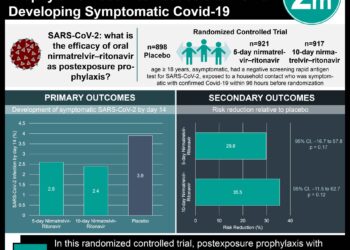Inhaled budesonide shortens time to recovery for high-risk COVID-19 patients in the community
1. Time to recovery was lower in patients assigned to budesonide compared to usual care, meeting the superiority criteria.
2. Rate of hospitalizations or death was numerically lower in the inhaled budesonide group compared to usual care.
Evidence Rating Level: 1 (Excellent)
Study Rundown: Systemic corticosteroids, such as dexamethasone, have been widely regarded as a therapeutic option in the management of patients with COVID-19 requiring oxygen. However, results from several trials around the world suggest that systemic corticosteroids may, in fact, increase the risk of COVID-19-related hospitalizations and death, and lead to systemic complications as well. Similarly, inhaled corticosteroids, such as budesonide, have been thought to offer the same anti-inflammatory benefits of systemic corticosteroids without the risk profile. However, the current evidence on their use in these settings has been limited. This randomized controlled trial aimed to assess the safety and efficacy of inhaled budesonide on COVID-19 related hospitalizations and deaths in high-risk patients. The coprimary outcomes for this study were time to patient recovery and COVID-19-related hospitalization or death, while key secondary outcomes were time to sustained recovery (at days 14 and 28 of study) and time to initial reduction in symptom severity. According to study results, use of inhaled budesonide resulted in a shortened time to self-recovery from COVID-19, meeting the prespecified superiority criteria. In addition, there was a numerically lower rate of hospitalization or death due to COVID-19 in the inhaled budesonide group compared to usual care. This study was strengthened by its inclusion of a relatively old age group, which is known to be at higher risk of COVID-19 compared to the general population.
Click to read the study in The Lancet
Relevant Reading: Dexamethasone in Hospitalized Patients with Covid-19
In-depth [randomized controlled trial]: From April 2, 2020, to March 31, 2021, 38 520 patients were screened for eligibility at primary care centers in the UK. Included patients were ≥65 years or older or ≥50 years with comorbidities and were symptomatic for COVID-19 up to two weeks prior. Ultimately, 4700 patients were randomized (1073 to budesonide, 1988 to usual care alone, and 1639 to other treatments), of which 67% (2655 of 3979) tested positive for SARS-CoV-2. Mean age among COVID-positive patients was 64.2 years (standard deviation [SD] 7.6), and the majority (92%) were White. Baseline characteristics were similar between groups.
The primary outcome of time to recovery was shorter in the budesonide group (11.8 days, 95% Bayesian credible interval [BCI] 10.0-14.1) compared to the usual care group (14.7 days, 95% BCI 12.3-18.0, hazard ratio [HR] 1.21), resulting in a median benefit of 2.94 days (95% BCI 1.19-5.11). The likelihood of hospitalization or death was lower among patients randomized to the budesonide group (6.8%, 95% BCI 4.1-10.2) versus the usual care group (8.8%, 95% BCI 5.5-12.7, odds ratio [OR] 0.75, 95% BCI 0.55-1.03), but this did not meet the prespecified superiority threshold. Regarding the secondary outcomes concerning time to sustained recovery (at days 14 and 28 post-randomization) and time to reduction in symptom severity, budesonide was superior to usual care. Serious adverse events including hospitalization for non-COVID-19 issues were rare, affecting two patients in the budesonide group and four in the usual care group. Findings from this study suggest that inhaled budesonide should be considered for high-risk COVID-19 patients in the community given its shortened time to recovery and relatively low risk profile.
Image: PD
©2021 2 Minute Medicine, Inc. All rights reserved. No works may be reproduced without expressed written consent from 2 Minute Medicine, Inc. Inquire about licensing here. No article should be construed as medical advice and is not intended as such by the authors or by 2 Minute Medicine, Inc.







